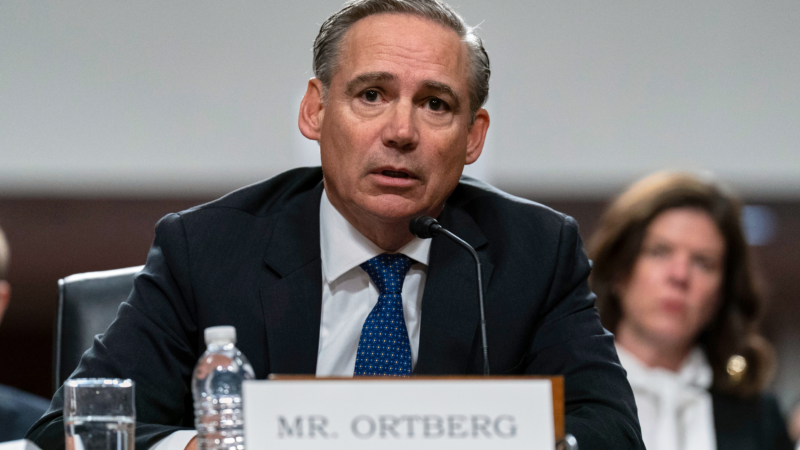Grilled by Senate, Boeing CEO admits to “serious missteps” on safety
Under sharp questioning from U.S. Senators Wednesday, the CEO of Boeing acknowledged a lax safety culture existed at the aircraft manufacturer but denied workers on Boeing’s factory floors were being pressured to speed up lagging production.
Boeing CEO Kelly Ortberg, who was appointed to his post just last August, appeared before the Senate Commerce Committee on Capitol Hill. The hearing, titled “Safety First: Restoring Boeing’s Status as a Great American Manufacturer,”” focused on the steps the company has taken to address production deficiencies and safety issues that led to the door plug blow out incident on an Alaska Airlines 737 MAX-9 jet in January last year.
National Transportation Safety Board investigators found that four critical bolts needed to secure the door plug in place were not reinstalled at the Boeing factory in Renton, Wash., leading the door plug to blow out of the fuselage of the plane in mid-air, causing a rapid depressurization in the cabin of the passenger jet. None of the 177 passengers and crew members on board were seriously hurt.
But Texas Republican Sen. Ted Cruz, who chairs the Commerce Committee, says “the incident produced fresh doubt about Boeing’s ability to safely build planes.”
“Efforts to cut corners in production or to move to the next production phase before necessary parts arrived have led to unacceptable failures,” Cruz said at the start of the committee hearing. He then went on to criticize Boeing’s “insufficient oversight” of its suppliers and of its own manufacturing process, which Cruz says led to “an unsustainable lack of safety culture at Boeing.”
In response, Ortberg acknowledged the company “has made serious missteps in recent years, and it is unacceptable.” But he insists the aerospace giant has “made sweeping changes to the people, processes, and overall structure of our company” to improve safety.
In regards to the specific failures that led to the door plug blowing out in flight, Ortberg took responsibility and vowed to fix the problems on the factory floor.
“It’s unacceptable that an aircraft left our factory without that door plug properly installed,” Ortberg told the Senate panel, adding, “and let me just make that perfectly clear, that can never, never happen again.”
Since the incident, the Federal Aviation Administration has capped Boeing’s production of 737 MAX jetliners, its best selling plane in company history, at 38 planes per month. But Ortberg acknowledged in Wednesday’s hearing that the airplane manufacturer isn’t even producing planes at that rate yet, and is about two years behind in delivering ordered 737 MAX airplanes to its airline customers.
Under questioning, Ortberg acknowledged that he’d like to eventually increase the rate of production to 38 by the end of the year, but he insisted the company is not in a rush to do so, nor is he pressuring factory employees to speed up their work.
“Look, I want to be clear, I’ve not provided financial guidance to Wall Street for the performance of the company, I’ve not provided guidance on how many aircraft we’re going to deliver, I’ve gone and gotten financial coverage so that we can allow our production system to heal,” Ortberg said. “I’m not pressuring the team to go fast. I’m pressuring the team to do it right.”
Boeing’s safety protocols and lax safety culture were already under intense scrutiny following the crashes of two 737 Max passenger jets just five months apart in 2018 and 2019 that killed a total of 346 people.
Several family members of those killed in the crashes attended the hearing. They held up photos of their brothers, sisters, husbands, wives and children who died.
Many say they want Boeing and the company’s top officials, especially those involved in the design and certification process of the 737 Max, held criminally accountable for the aircraft’s design and production flaws and for deceiving safety regulators.
Ortberg told senators Wednesday that the company is in talks with the Justice Department in hopes of reaching a revised plea agreement to resolve a criminal fraud charge. Boeing is accused of misleading the FAA about a flawed flight control system that investigators blame in part for causing the MAX crashes.
“I want this resolved as fast as anybody,” Ortberg told the committee. “Hopefully, we’ll have a new agreement here soon.”
Last July, the company agreed to plead guilty to one count of criminal fraud conspiracy and to pay a $243 million fine and an additional $455 million on compliance and safety programs. But in December, the Texas federal judge overseeing the base rejected the deal, and last week, he set a June 23 trial date for the company.
Rideshare union rights, social media limits and other state laws taking effect Jan. 1
Every new year, public media reporters across the country bring us some of the new state laws taking effect where they are. Here are six in 2026.
Guides to help you tackle your New Year’s resolutions
From building your strength to tackling credit card debt, NPR's Life Kit has a newsletter journey to help you tackle your New Year's resolution.
Guides to help you tackle your New Year’s resolutions
From building your strength to tackling credit card debt, NPR's Life Kit has a newsletter journey to help you tackle your New Year's resolution.
Dozens presumed dead in fire at Swiss Alps bar during New Year’s celebration
Dozens of people are presumed dead and about 100 injured, most of them seriously, following a fire at a Swiss Alps bar during a New Year's celebration, police said Thursday.
Crypto soared in 2025 — and then crashed. Now what?
For most of 2025, cryptocurrencies such as bitcoin surged as President Trump vowed to make the U.S. a crypto leader. But now, a severe sell-off has shaken the sector.
Warren Buffett officially retires as Berkshire Hathway’s CEO
The legendary 95-year-old investor spent decades building his company into one of the world's largest and most powerful. Now Greg Abel is taking it over.






